
October 15
1529 Ottoman Empire: The Siege of Vienna ends as the the invading Turks are repelled, turning the tide against almost a century of unchecked conquest throughout eastern and central Europe by the Ottoman Empire. [For further information, click here.]
1844 Birth: Friedrich Nietzsche:
German classical scholar, philosopher, and critic of culture, who became one of the most-influential of all modern thinkers. His attempts to unmask the motives that underlie traditional Western religion, morality, and philosophy deeply affected generations of theologians, philosophers, psychologists, poets, novelists, and playwrights. He thought through the consequences of the triumph of the Enlightenment's secularism, expressed in his observation that "God is dead," in a way that determined the agenda for many of Europe's most-celebrated intellectuals after his death. Although he was an ardent foe of nationalism, anti-Semitism, and power politics, his name was later invoked by fascists to advance the very things he loathed. . . .
The association of Nietzsche's name with Adolf Hitler and fascism owes much to the use made of his works by his sister, Elisabeth. She had married a leading chauvinist and anti-Semite, Bernhard Foerster, and after his suicide in 1889 she worked diligently to refashion Nietzsche in Foerster's image. Elisabeth maintained ruthless control over Nietzsche's literary estate and, dominated by greed, produced collections of his "works" consisting of discarded notes, such as Der Wille zur Macht (1901; The Will to Power). She also committed petty forgeries. Generations of commentators were misled. Equally important, her enthusiasm for Hitler linked Nietzsche's name with that of the dictator in the public mind. . . .
Nietzsche once wrote that some men are born posthumously, and that is certainly true in his case. The history of philosophy, theology, and psychology since the early 20th century is unintelligible without him. The German philosophers Max Scheler, Karl Jaspers, and Martin Heidegger laboured in his debt, for example, as did the French philosophers Albert Camus, Jacques Derrida, and Michel Foucault. Existentialism and deconstruction, a movement in philosophy and literary criticism, owe much to him. The theologians Paul Tillich and Lev Shestov acknowledged their debt, as did the "God is dead" theologian Thomas J.J. Altizer; Martin Buber, Judaism's greatest 20th-century thinker, counted Nietzsche among the three most-important influences in his life and translated the first part of Zarathustra into Polish. The psychologists Alfred Adler and Carl Jung were deeply influenced, as was Sigmund Freud, who said of Nietzsche that he had a more-penetrating understanding of himself than any man who ever lived or was ever likely to live. Novelists like Thomas Mann, Hermann Hesse, AndrÉ Malraux, AndrÉ Gide, and John Gardner were inspired by him and wrote about him, as did the poets and playwrights George Bernard Shaw, Rainer Maria Rilke, Stefan George, and William Butler Yeats, among others. Nietzsche's great influence is due not only to his originality but also to the fact that he was one of the German language's most-brilliant prose writers. [For further information, click here.]
1881 Birth: Sir P.G. Wodehouse:
English-born comic novelist, short-story writer, lyricist, and playwright, best known as the creator of Jeeves, the supreme "gentleman's gentleman." He wrote more than 90 books and more than 20 film scripts and collaborated on more than 30 plays and musical comedies. . . . Wodehouse was educated at Dulwich College, London, and, after a period in a bank, took a job as a humorous columnist on the London Globe (1902) and wrote freelance for many other publications. After 1909 he lived and worked for long periods in the United States and in France. He was captured in France by the Germans in 1940 and spent much of the war interned in Berlin. In 1941 he made five radio broadcasts from there to the United States in which he humorously described his experiences as a prisoner and subtly ridiculed his captors. His use of enemy broadcasting facilities evoked deep and lasting resentment in Britain, however, which was then practically under siege by Germany. After the war Wodehouse settled in the United States, becoming a citizen in 1955. He was knighted in 1975. [For further information, click here.]
1894 Dreyfus Affair:
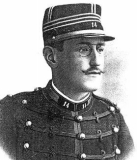
French Captain Alfred Dreyfus, a Jewish army officer, is arrested for allegedly betraying military secrets to Germany. Note: He will eventually be exonerated. [For further details, Click here.]
1914 World War I: Various:
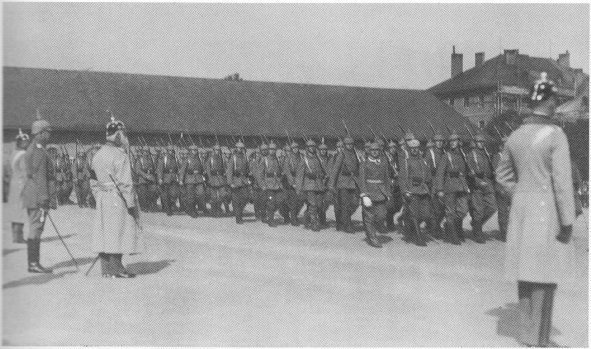
List Regiment Oct 11 - 20): Infantry Recruit Adolf Hitler's 1st Company, 16th Bavarian Reserve Infantry, train at Lechfeld, at the confluence of the Lech and the Danube, seventy miles west of Munich. [For further details, Click here.]
The USAdeclares it will not prohibit shipments of gold or the extension of credit to belligerents. (See August 15)
War at Sea: The British cruiser HMS Hawke is torpedoed and sunk by a German U-boat.
During 1914, at the start of the First World War, the Hawke, commanded by Captain Hugh P.E.T. Williams, was engaged in various operations in the North Sea. On 15 October, out on patrol Hawke was torpedoed by a German submarine U- 9. Her sister ship HMS Theseus, which was in company, was attacked at the same time but was undamaged. The Hawke sank in a few minutes, with the loss of her Captain, 26 officers and 500 men; only 4 officers and about 60 men were saved. [For further details, Click here.]
1915 World War I: Various:
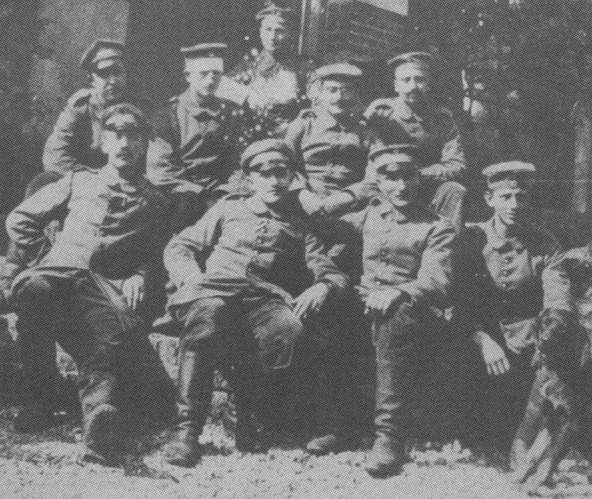
List Regiment (Oct 4, 1915-Feb 29, 1916): Gefreiter Adolf Hitler's regiment serves with 16 Reserve Infantry Regiment at Fromelles. [For further details, Click here.]
Turkish Front:
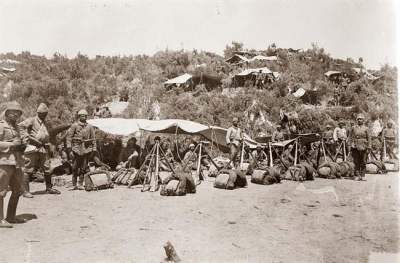
Sir Ian Hamilton is relieved at Gallipoli and replaced by General Sir Charles Monro, who soon directs a masterful evacuation.
US bankers arrange a $500 million loan to the British and French.
War at Sea: Admiral Henning von Holzendorff visits Max Warburg at his home to ask his opinion on the economic impact of intensified U-boat warfare. Warburg tells him that unrestricted U-boat warfare will only draw America into the war. (THP)
1916 List Regiment (Oct 9 - Dec 3):
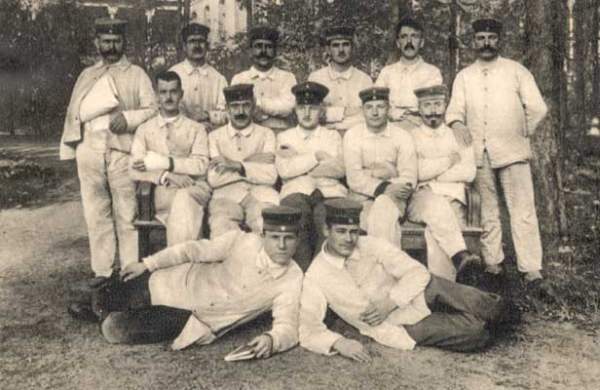
Hitler, who had been fighting almost continuously for two years, finds himself on a hospital train headed for a Red Cross hospital in Beelitz, near Berlin. While his wound is serious, he will recover quickly, and will later write Balthaser Brandmayer: "Am suffering from hunger-induced typhus because I cannot eat bread; additionally I am adamantly denied any sort of jam." [For further details, Click here.]
1917 World War I: Mata Hari executed:

Mata Hari, the archetype of the seductive female spy, is executed for espionage by a French firing squad at Vincennes outside of Paris.
She first came to Paris in 1905 and found fame as a performer of exotic Asian-inspired dances. She soon began touring all over Europe, telling the story of how she was born in a sacred Indian temple and taught ancient dances by a priestess who gave her the name Mata Hari, meaning "eye of the day" in Malay. In reality, Mata Hari was born in a small town in northern Holland in 1876, and her real name was Margaretha Geertruida Zelle. She acquired her superficial knowledge of Indian and Javanese dances when she lived for several years in Malaysia with her former husband, who was a Scot in the Dutch colonial army. Regardless of her authenticity, she packed dance halls and opera houses from Russia to France, mostly because her show consisted of her slowly stripping nude.
She became a famous courtesan, and with the outbreak of World War I her catalog of lovers began to include high-ranking military officers of various nationalities. In February 1917, French authorities arrested her for espionage and imprisoned her at St. Lazare Prison in Paris. In a military trial conducted in July, she was accused of revealing details of the Allies' new weapon, the tank, resulting in the deaths of thousands of soldiers. She was convicted and sentenced to death, and on October 15 she refused a blindfold and was shot to death by a firing squad at Vincennes.
There is some evidence that Mata Hari acted as a German spy, and for a time as a double agent for the French, but the Germans had written her off as an ineffective agent whose pillow talk had produced little intelligence of value. Her military trial was riddled with bias and circumstantial evidence, and it is probable that French authorities trumped her up as "the greatest woman spy of the century" as a distraction for the huge losses the French army was suffering on the western front. Her only real crimes may have been an elaborate stage fallacy and a weakness for men in uniform. (History.com)
1917 World War I (Sep 30-Oct 17):
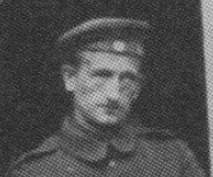
Hitler contines an eighteen-day furlough, accompanying Schmidt [above] on a visit to his sister in Dresden with him. After sightseeing stops at Brussels and Cologne, they hit Leipzig, a city Hitler especially enjoys. He is impressed by the 300-foot tall monument, Battle of the Nations, honoring the war-dead of 1812. "This has nothing to do with art," he tells Schmidt (above), "but it is enormous and beautiful." After spending some time with Schmidt in Dresden, Hitler goes off by himself to Berlin to spend a few days with yet another front-line comrade. In a postcard to Schmidt, he writes: "The city is marvelous. A real world capital. Traffic is still tremendous. Am gone almost all day. Now finally have opportunity to study the museums a little better. In short: there is nothing lacking." [For further details, Click here.]
1918 World War I (Oct 15 - Nov 10):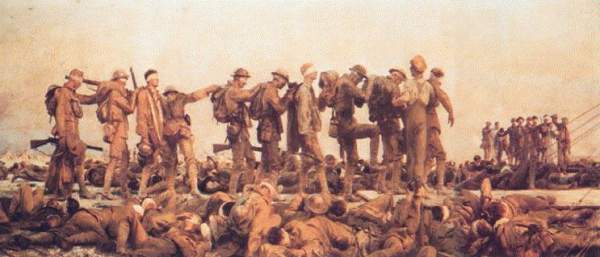
Gefreiter Adolf Hitler, blinded in a gas attack near Werwick, is taken to the Prussian Reserve Hospital at Pasewalk near Berlin. The doctors at this army hospital, on the cutting edge of medical treatments for gassed soldiers, provide Hitler with very good care, and his sight slowly and painfully begins to return to him over the following few weeks. Hitler falls into a deep depression. After over four years on the front lines, his fighting days are over.
In four years of war, the List Regiment has lost 3,754 dead, 8,795 wounded, with 678 taken prisoner. This is somewhat above the average for the German Armed Forces as a whole. [For further details, Click here.]
I was sent into hospital at Pasewalk in Pomerania, and there it was that I had to hear of the Revolution.
For a long time there had been something in the air which was indefinable and repulsive. People were saying that something was bound to happen within the next few weeks, although I could not imagine what this meant. In the first instance I thought of a strike similar to the one which had taken place in spring. Unfavorable rumors were constantly coming from the Navy, which was said to be in a state of ferment. But this seemed to be a fanciful creation of a few isolated young people. It is true that at the hospital they were all talking about the end of the war and hoping that this was not far off, but nobody thought that the decision would come immediately. I was not able to read the newspapers.
1919 Weimar:
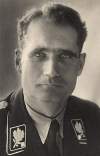
Rudolf Hess resigns from General von Epp's Freikorps. (THP)
1924 Weimar: The ZR-3 flies 5000 miles—the longestest Zeppelin flight to date:
The second USS Los Angeles was a rigid airship, designated ZR-3, that was built in 1923-1924 by the Zeppelin factory in Friedrichshafen, Germany, where it was originally designated LZ-126. The airship was given to the United States by the German Government, as it was partially funded by war reparations from World War I. [For further details, Click here.]
1935 The Kriegsakademie (Reich War Academy) is reopened in Berlin:
Scharnhorst recognized that an army would not always have a genius like Frederick the Great or Napoleon but that educated and capable officers serving in staff positions and advising a field commander could assure such genius on a continuing basis. He envisioned staff officers rotating between staff and field positions, providing a free and steady flow of ideas throughout the general staff and the army itself. [For further details, Click here.]
1936 Holocaust: Jewish teachers in Germany are forbidden to tutor 'Aryan' children. (THP)
1939 World War II: Various:
From a memorandum compiled by Raeder and the German naval war staff:
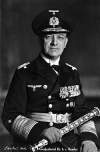
Possibilities of Future Naval Warfare: I. Military requirements for the decisive struggle against Great Britain: Our naval strategy will have to employ all the military means at our disposal as expeditiously as possible. Military success can be most confidently expected if we attack British sea communications wherever they are accessible to us, with the greatest ruthlessness; the final aim of such attacks is to cut off all imports into and exports from Britain. We should try to consider the interests of neutrals in so far as this is possible without detriment to military requirements.
It is desirable to base all military measures taken on existing international law; however, measures which are considered necessary from a military point of view, provided a decisive success can be expected from them, will have to be carried out, even if they are not covered by existing international law. In principle, therefore, any means of warfare which is effective in breaking enemy resistance should be based on some legal conception even if that entails the creation of a new code of naval warfare. The supreme war council...will have to decide what measures of military and legal nature are to be taken. Once it has been decided to conduct economic warfare in its most ruthless form, in fulfillment of military requirements, this decision is to be adhered to under all circumstances.
Under no circumstances may such a decision for the most ruthless form of economic warfare, once it has been made, be dropped or released under political pressure from neutral powers; that is what happened in the World War to our own detriment. Every protest by neutral powers must be turned down. Even threats of further countries, particularly of the United States, coming into the war, which can be expected with certainty should the war last a long time, must not lead to a relaxation in the form of economic warfare once embarked upon.
The more ruthlessly economic warfare is waged, the earlier will it show results and the sooner will the war come to an end. The economic effect of such military measures on our own war economy must be fully recognized and compensated through immediate reorientation of German war economy and the redrafting of the respective agreements with neutral states; for this, strong political and economic pressure must be employed if necessary.
Holocaust: Of the 16,000 Polish civilians executed in the first six weeks of the war, 5,000 are Jewish. About 250,000 Jews escape from the Germans into the Soviet Union. Some are immediately deported to labor camps in Siberia, where many of them later die. (THP)
1940 World War II: Various:
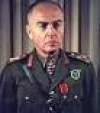
Antonescu assumes command of the Iron Guard, strengthening his position in Romania.
Blitz: A 500lb bomb hits Broadcasting House, London, killing seven people:
It was not only the BBC's correspondents who found themselves in the front line in WWII. There was no escape for many of those who had stayed behind in London. The Broadcasting House newsroom had been moved to the basement when the London Blitz began in September 1940. The building was protected by concrete blocks, sandbags and armed guards. But this was no defence when BH took a direct hit from a delayed-action German bomb on 15 October 1940. It came to rest in the music library on the fifth floor - not far from the editorial team looking after the monitoring service. The bomb eventually exploded as attempts were being made to push it outside. Seven people were killed. [For further details, Click here.]
1941 World War II: Various:
Barbarossa: Odessa, a Russian port on the Black Sea which had been surrounded by German troops for several weeks, is evacuated by the Russians.
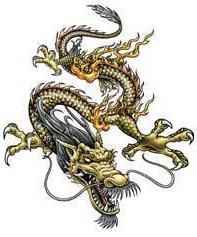
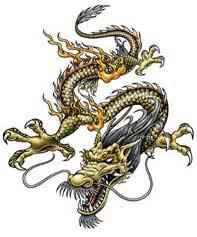
The German forces are around the city about 96 kilometers from Moscow, and their shells can reach the outside dispositions of the city. The Japanese Cabinet reached the final point last night. Now we have to choose between war and peace (compromise). But the present Cabinet has no power to take the policy of war or compromise with the US. If Japan should compromise with the United States, the latter would put more and more pressure over the former to the point of the former's surrender. If Japan should surrender to the US, the result would be the destruction of the Japanese race spirit.
Turning the eye to the Navy, the Navy would be deemed week and the result would be the loss of the Navy's credit among the people; then it should not even be dreamed to replete the Navy. On the contrary, the Army will turn their course to the Chinese continent with the expression of triumph on their faces as if to say "it is only the Army that can support the fatherland." But in case the policy of the Army should fail, Chiang Kai-shek or even Wang Ching-wei may change sides. There will be a more difficult situation. It is now the turning point to turn the nation's eyes to the importance of the ocean from that of the Continent. If we cannot do this, we have to face the decline and fall of the mother country at last. How critical it is now! Its main cause is the deficiency of the people's understanding of the ocean. At the moment when people are going to be wakened up, all is going to be pushed back. What does this mean? (Dillon)
Holocaust: From a report of Einsatzgruppe A, covering the period up to 15 October 1941:
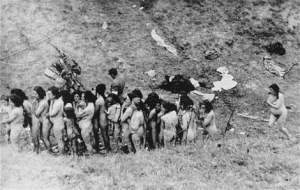
EinsatzGroup A, after preparing their vehicles for action, proceeded to their area of concentration as ordered on 23 June 1941, the second day of the campaign in the East. Army Group North, consisting of the 16th and 18th Armies and Panzer Group 4, had started the advance the day before. Our task was to establish hurriedly personal contact with the commanders of the armies and with the commander of the army rear area. It must be stressed from the beginning that cooperation with the Armed Forces was generally good; in some cases, for instance with Panzer Group 4 under Colonel General Hoppner, it was very close and almost cordial. Misunderstandings which cropped up with some authorities in the first days were cleared up mainly through personal discussions...
Similarly, native anti-Semitic forces were induced to start pogroms against Jews during the first hours after the entry, though this inducement proved to be very difficult. Following our orders the Security Police was determined to solve the Jewish question with all possible means and most decisively. But it was desirable that the Security Police should not put in an immediate appearance, at least in the beginning, since the extraordinarily harsh measures were apt to stir even German circles. It had to be shown to the world that the native population itself took the first action by way of natural reaction against the suppression by Jews during several decades and against the terror exercised by the Communists during the preceding period...
After the failure of purely military activities, such as the placing of sentries and combing through the newly occupied territories with whole divisions, even the Armed Forces had to look out for new methods. The Einsatz group undertook the search for new methods as an essential task. Soon, therefore, the Armed Forces adopted the experiences of the Security Police and their methods of combating the partisans. For details I refer to the numerous reports concerning the struggle against the partisans...
Instigation of self-cleansing actions: Considering that the population of the Baltic countries had suffered very heavily under the government of bolshevism and Jewry while they were incorporated in the USSR, it was to be expected that after the liberation from that foreign government, they (that is, the population themselves) would render harmless most of the enemies left behind after the retreat of the Red Army. It had to be the duty of the Security Police to set in motion these self-cleansing movements and to direct them into the correct channels in order to accomplish the purpose of the cleansing operations as quickly as possible. It was no less important, in view of the future, to establish the unshakeable and provable fact that the liberated population themselves took the most severe measures against the bolshevist and Jewish enemy quite on their own, so that the direction by German authorities couldn't be found out.
In Lithuania this was achieved for the first time by partisan activities in Kovno. To our surprise it was not easy, at first, to set in motion an extensive pogrom against the Jews. Klimatis, the leader of the partisan unit mentioned above, who was used for this purpose primarily, succeeded in starting a pogrom on the basis of advice given to him by a small advanced detachment acting in Kovno and in such a way that no German order or German instigation was noticed from the outside.
During the first pogrom in the night from 25 to 26 June, the Lithuanian partisans did away with more than 1,500 Jews, setting fire to several synagogues or destroying them, by other means and burning down a Jewish dwelling district consisting of about 60 houses. During the following nights 2,300 Jews were eliminated in a similar way. In other parts of Lithuania similar actions followed the example of Kovno, though smaller and extending to the Communists who had been left behind. These self-cleansing actions went smoothly because the Army authorities, who had been informed, showed understanding for this procedure. From the beginning it was obvious that only the first days after the occupation would offer the opportunity for carrying out pogroms. After the disarmament of the partisans the self-cleansing actions ceased necessarily...
Occasionally the conditions prevailing in the lunatic asylums necessitated operations of the Security Police. Many institutions had been robbed by the retreating Russians of their whole food supply. Often the guard and nursing personnel had fled. The inmates of several institutions broke out and became a danger to the general security; therefore, in Aglona (Lithuania) 544 lunatics, in Mariampol (Lithuania) 109 lunatics, and in Mogutowo, near Luga, 95 lunatics were liquidated...In some cases authorities of the Armed Forces asked us to clean out, in a similar way, other institutions which were wanted as billets. However, as interests of the Security Police did not require any intervention, it was left to the authorities of the Armed Forces to take the necessary action with their own forces...
When it was decided to extend the German operations to Leningrad and also to extend the activities of Einsatz Group A to this town, I gave orders on 18 July 1941, to parts of Einsatzkommandos 2 and 3 and to the staff of the group to advance to Novosselje, in order to prepare these activities and to be able to advance as early as possible into the area around Leningrad and into the city itself. The advance of the forces of Einsatz Group A, which were intended to be used for Leningrad, was effected in agreement with and on the express wish of Panzer Group 4...
Einsatzkommandos of Einsatz Group A of the Security Police participated from the beginning in the fight against the nuisance created by partisans. Close collaboration with the Armed Forces and the exchange of experiences which were collected in the fight against partisans, brought about a thorough knowledge of the origin, organization, strength, equipment and system used by the Red partisans as time went on.
Holocaust: The German authorities in Poland decree that any Jews found outside the ghettos will be executed automatically. (THP)
Holocaust: Mass deportations of German Jews to the East begins. Priests are told that Christian 'non-Aryans' will be evacuated only when earlier conflicts with the Gestapo have occurred. For the time being, 'non-Aryans' in mixed marriages will not be affected by these measures. (THP)
[See: Can We, and Should We, Try to Explain the Holocaust?]1942 Church and Reich: Ernst Woermann, director of the political department of the Foreign Ministry, records that Papal Nuncio Orsenigo in Berlin had made several inquiries about mass shootings and the fate of the deported Jews with "some embarrassment and without emphasis." (THP)
1944 World War II: Various:

Hungary: The Hungarian chief of state, Admiral Horthy, shortly after announcing Hungary's withdrawal from the war against the USSR, is taken prisoner by a commando unit led by SS major Otto Skorzeny. A new government under Ferenc Szalasi vows to continue the alliance with Germany.
Holocaust: As Allied forces approach Strasbourg, Himmler orders the Anatomical Institute to destroy its collection of Jewish skulls and skeletons, but many related documents survive the war. (See June 21, 1943)
[See: How Widespread Was Guilty Knowledge of the Holocaust?]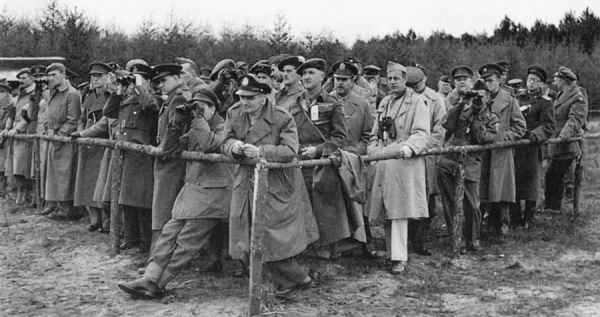
The USSR sends six Soviet representatives, including Sergey Korolyov, to witness the third, and last, British demonstration launch of a V-2 at Cuxhaven. The British had invited each Ally to send three observers to witness their test firing of a V-2. The Soviets sent six, not three. The British only admitted the allowed three into the facility to witness the test, forcing the other three to try to see, from outside, what was going on. (Piszkiewicz)
[See: Wunderwaffen: Hitler's Deception and the History of Rocketry.]1945 Death: Pierre Laval: the puppet leader of Nazi-occupied Vichy France, is executed by firing squad for treason against France.
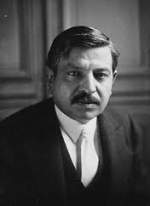
Laval, originally a deputy and senator of pacifist tendencies, shifted to the right in the 1930s while serving as minister of foreign affairs and twice as the French premier. A staunch anti-communist, he delayed the Soviet-Franco pact of 1935 and sought to align France with Fascist Italy. Hostile to the declaration of war against Germany in 1939, Laval encouraged the antiwar faction in the French government, and with the German invasion in 1940 he used his political influence to force an armistice with Germany. Henri Petain took over the new Vichy state, and Laval served as minister of state. Laval was dismissed by Petain in December 1940 for negotiating privately with Germany.
By 1942, Laval had won the trust of Nazi leader Adolf Hitler, and the elderly Petain became merely a figurehead in the Vichy regime. As the premier of Vichy France, Laval collaborated with the Nazi programs of oppression and genocide, and increasingly became a puppet of Hitler. After the Allied liberation of France, he was forced to flee east for German protection. With the defeat of Germany in May 1945, he escaped to Spain but was expelled and went into hiding in Austria, where he finally surrendered to American authorities in late July. Extradited to France, Laval was convicted of treason by the High Court of Justice in a sensational trial. Condemned to death, he attempted suicide by poison but was nursed back to health in time for his execution, on October 15, 1945. (History.com)
1946 Death: Hermann Goering: At 10:45PM, just two hours before his scheduled execution, Field Marshal Hermann Goering bites a cyanide capsule in his cell at Nuremberg, committing suicide. It is the ultimate act of defiance and well appreciated by die-hard Nazis all across occupied Germany. Goering leaves several letters behind in his cell. This one is addressed to Colonel Andrus:
Since my imprisonment I have always kept the poison capsule on my person. I had three capsules when I was committed to prison in Mondorf. The first one I left in my clothing, so that it would be found in the search. The second I left under the coatstand while undressing and took it again when I dressed. I hid this in Mondorf and here in the cell so well that, in spite of the frequent and very thorough searches, it could not be found. During the trial I kept it in my high riding boots. The third capsule is still in my toilet case in the round container of skin cream (hidden in the cream). I had two opportunities to take the capsule in Mondorf, had I needed it. No one in charge of the searches was at fault, since it was almost impossible to find the capsule. It would have been purely by chance." PS: "Doctor Gilbert told me that the Control Counsil rejected the change in the manner of execution to death by firing squad.
[See: How Did Goering Manage His Suicide?]1957 Spandau Prison: From Spandau: The Secret Diaries, by Albert Speer:
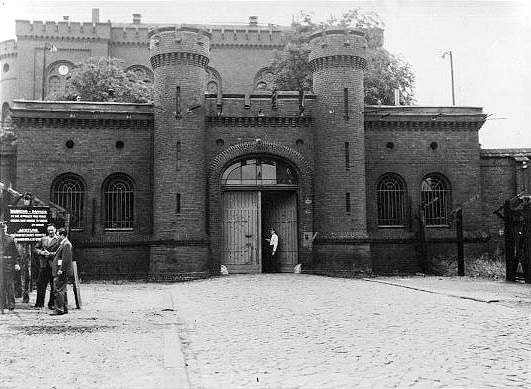
Funk has sent a clandestine communication to Schirach saying that in October the Four Powers will meet in Berlin to make preparations for the dissolution of Spandau.
2005 USA: A march by members of the National Socialist Movement, a neo-Nazi group, in Toledo, Ohio, US, sparks a riot among protestors. [For further information, click here.]
Edited by Levi Bookin (Copy editor)
levi.bookin@gmail.com



Click to join 3rdReichStudies



Disclaimer: This site includes diverse and controversial materials--such as excerpts from the writings of racists and anti-Semites--so that its readers can learn the nature and extent of hate and anti-Semitic discourse. It is our sincere belief that only the informed citizen can prevail over the ignorance of Racialist "thought." Far from approving these writings, this site condemns racism in all of its forms and manifestations.
Fair Use Notice: This site may contain copyrighted material the use of which has not always been specifically authorized by the copyright owner. We are making such material available in our efforts to advance understanding of historical, political, human rights, economic, democracy, scientific, environmental, and social justice issues, etc. We believe this constitutes a "fair use" of any such copyrighted material as provided for in section 107 of the US Copyright Law. In accordance with Title 17 U.S.C. Section 107, the material on this site is distributed without profit to those who have expressed a prior interest in receiving the included information for research and educational purposes. If you wish to use copyrighted material from this site for purposes of your own that go beyond 'fair use', you must obtain permission from the copyright owner.
Please Note: The list-owner and moderators of 3rdReichStudies are not responsible for, and do not necessarily approve of, the random ads placed on our pages by our web server. They are, unfortunately, the price one pays for a 'free' website.